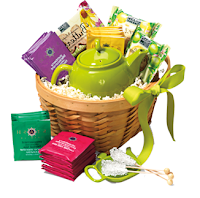It’s an age-old question: What’s better for you, coffee or tea? Even
back in the 18th century, inquiring minds wanted to know. King Gustav
III of Sweden, being of the belief that coffee was poisonous, devised an
interesting experiment to answer the question definitively. He found
two identical twins in prison, both sentenced to death for crimes they
had committed. Gustav III commuted their sentences to mere life
imprisonment (which was no picnic either, given prison conditions back
then).
In return for his kingly generosity, the twins had to agree to participate in an experiment: One twin had to drink three pots of coffee a day. The other had to drink three pots of tea a day. Two court physicians were procured to oversee the experiment. Sadly, the physicians died before the experiment was over, as did the king, who was assassinated in 1792. Had he lived, he would have seen the tea-drinking twin live until the age of 83. The coffee drinker? He lived even longer, although we don’t know exactly how much longer. Score one for coffee, if you believe in the efficacy of 18th-century science.
In terms of which is more popular, if you look at numbers alone, tea wins, hands down. While 1.6 billion cups a day of coffee are consumed on planet Earth, twice as many cups of tea are consumed. In the U.S., however, coffee reigns supreme, with Americans consuming $10 billion worth of coffee, against about $2 billion worth of tea. Tea consumption is rising fast in the States, however. Sales of tea have risen for more than 20 years running. The Tea Association of the USA reports that on any given day, 160 million Americans drink tea, hot or iced.
A lot of people believe they should cut down on their caffeine intake. The common belief is that caffeinated beverages in general will dehydrate you. It’s not true. As far back as 1928, tests were conducted to ascertain the truth of caffeine’s effects on hydration. In that early test, three men (admittedly a small sample) were required to drink four cups of coffee a day. They also drank tea, water and caffeine-infused water. Measuring their volume of urine, there was no ultimate difference in liquid elimination from the body.
In return for his kingly generosity, the twins had to agree to participate in an experiment: One twin had to drink three pots of coffee a day. The other had to drink three pots of tea a day. Two court physicians were procured to oversee the experiment. Sadly, the physicians died before the experiment was over, as did the king, who was assassinated in 1792. Had he lived, he would have seen the tea-drinking twin live until the age of 83. The coffee drinker? He lived even longer, although we don’t know exactly how much longer. Score one for coffee, if you believe in the efficacy of 18th-century science.
In terms of which is more popular, if you look at numbers alone, tea wins, hands down. While 1.6 billion cups a day of coffee are consumed on planet Earth, twice as many cups of tea are consumed. In the U.S., however, coffee reigns supreme, with Americans consuming $10 billion worth of coffee, against about $2 billion worth of tea. Tea consumption is rising fast in the States, however. Sales of tea have risen for more than 20 years running. The Tea Association of the USA reports that on any given day, 160 million Americans drink tea, hot or iced.
A lot of people believe they should cut down on their caffeine intake. The common belief is that caffeinated beverages in general will dehydrate you. It’s not true. As far back as 1928, tests were conducted to ascertain the truth of caffeine’s effects on hydration. In that early test, three men (admittedly a small sample) were required to drink four cups of coffee a day. They also drank tea, water and caffeine-infused water. Measuring their volume of urine, there was no ultimate difference in liquid elimination from the body.







